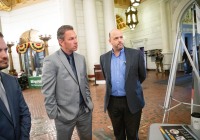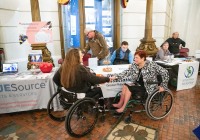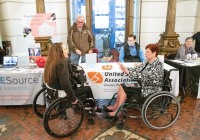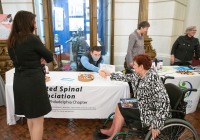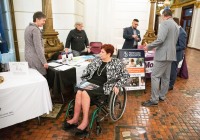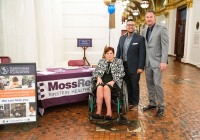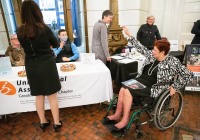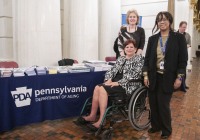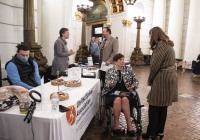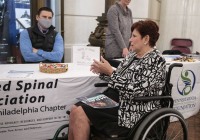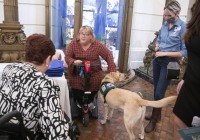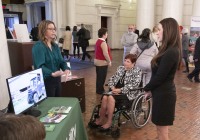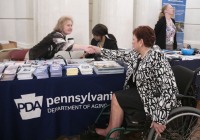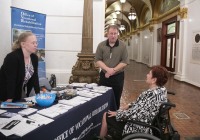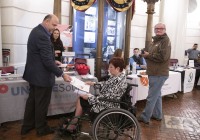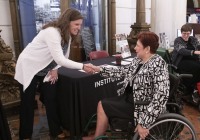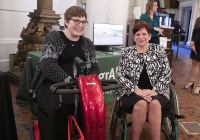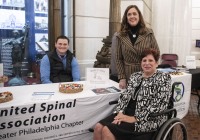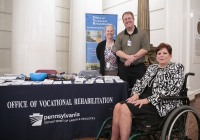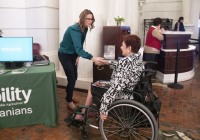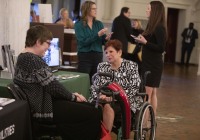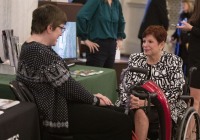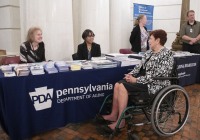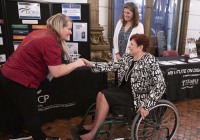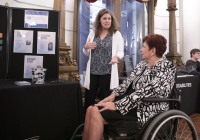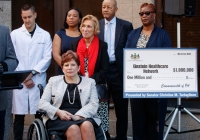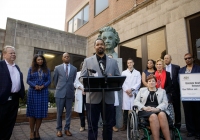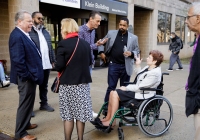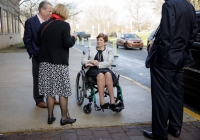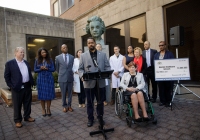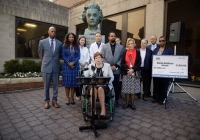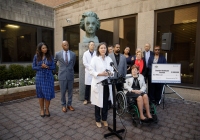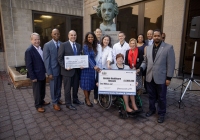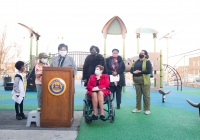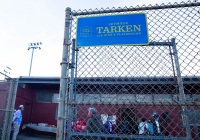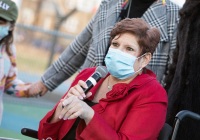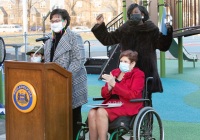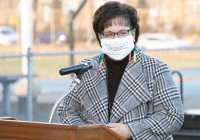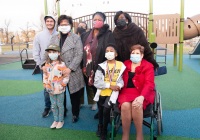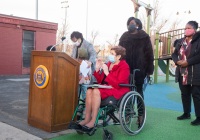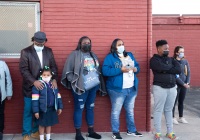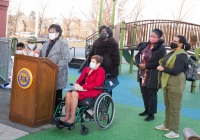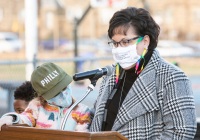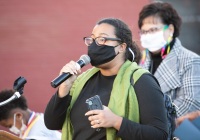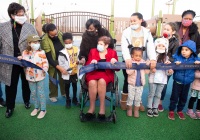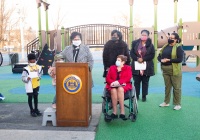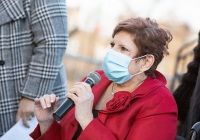
by Christin Brown | November 15, 2022 | feature, News Releases
Harrisburg, PA – November 15, 2022 − Today, Senator Christine Tartaglione was elected by her Senate Democratic colleagues to become the first female to serve as Democratic Whip in Pennsylvania Senate history. Senator Tartaglione is also the first person with a disability to serve as the Whip of any caucus in the state’s 235-year history.
When the Senate returns in the ’23-’24 legislative session Senator Tartaglione will bring more than 28 years of experience and relationships to the Whip position.
“For nearly three decades, I have had the honor to serve the people of the 2nd district of Pennsylvania,” said Senator Tartaglione. “I have seen my fair share of bad bills pass and great bills squandered away into the abyss of parliamentary procedure. Being able to pull upon seven terms worth of experience and bi-partisan relationships will help our caucus move forward our progressive priorities.”
Other Senate Democrats elected to leadership roles include:
- Leader – Jay Costa, Jr.
- Appropriations Committee Chair – Vincent Hughes
- Chair – Wayne D. Fontana
- Secretary – Maria Collett
###

by Christin Brown | October 27, 2022 | News Releases
Philadelphia, October 27, 2022 – Today, Senators Tina Tartaglione and Jimmy Dillon announced $2,500,000 for two projects in Northeast Philadelphia. The grants were awarded from the additional Redevelopment Assistance Capital Program (RACP) to further support community and economic development throughout Pennsylvania.
“Philadelphia has long been known as a premier education and medical city,” said Sen. Tartaglione. “The funding of this grant will help support two great Philadelphia institutions and will enable both to continue to be leaders in their fields.”
RACP projects are authorized in the Redevelopment Assistance section of a Capital Budget Itemization Act, have a regional or multi-jurisdictional impact, and generate substantial increases or maintain current levels of employment, tax revenue, or other measures of economic activity.
“I’m always glad to team-up with my friend and colleague Senator Tartaglione,” said Sen. Dillon. “I’m proud we’re investing in cutting edge cancer research at Fox Chase and innovative vocational training at Father Judge. Working together, I know this is only the beginning of what we can accomplish for Northeast Philly.”
The two projects receiving fundings are:
- Research Facility Modernization, Fox Chase Cancer Center, $1,500,000 – the project will transform the FCCC Laboratory Facility into a cancer model production and analysis hub. It will also renovate the central Laboratory Facility building by overhauling the air handling controls and replacing the lighting systems.
- The Friends of Father Judge High School, Inc., $1,000,000 – Funds would be specifically allocated toward the construction of the Career Pathways Academy Building. Construction to include a state-of-the art 20,000 square foot two story structure built for the purpose of delivering high level vocational education and workforce development. The CTE Academy will have a large common area for multiple trade disciplines to be taught simultaneously while three classrooms and additional breakout spaces will be created on the first floor to allow for students to migrate from hands-on activities into classroom environments to further study their craft. The second floor will have additional workshop spaces, offices for instructors, and an observation deck for administrators to view the multiple disciplines being taught from a safe distance.
###
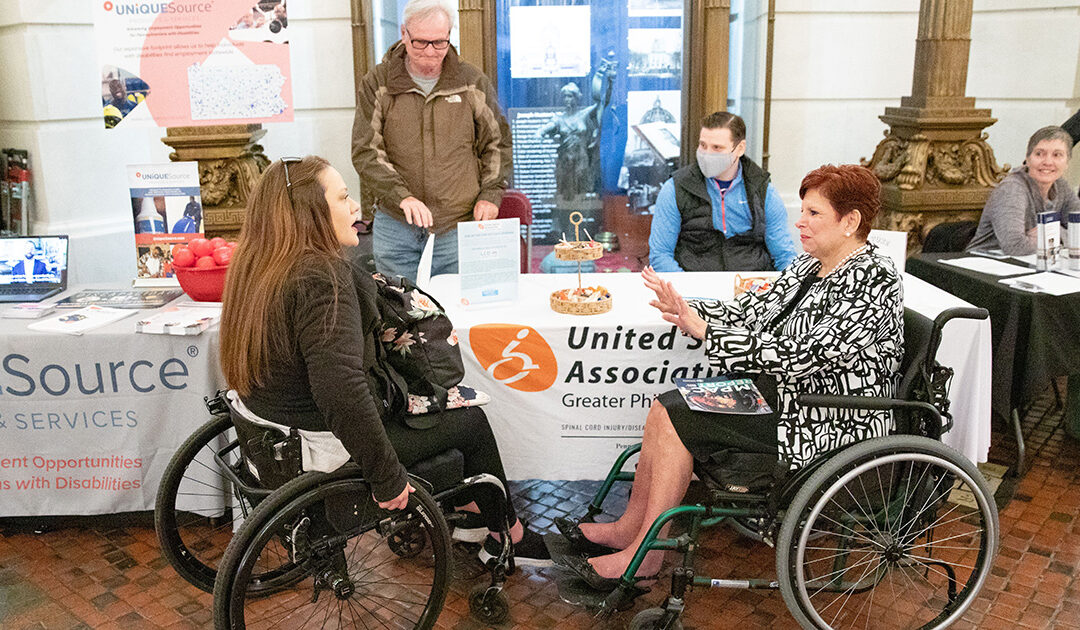
by Christin Brown | October 18, 2022 | feature, News Releases
Harrisburg, PA − October 18th, 2022 – Sen. Christine Tartaglione today hosted Disability Awareness Day in the Pennsylvania Capitol to highlight October as National Disability Employment Awareness Month in Pennsylvania.
Tartaglione, the longest-serving disabled member of the Pennsylvania General Assembly, hosted the event to allow advocacy organizations, along with public and private providers, to share information about assistive services and technology. All members of the legislature and the public were invited to attend.
“People living with physical and cognitive challenges face an uphill battle every day simply accessing everyday essentials let alone meaningful employment,” said Tartaglione. “Events like Disability Awareness Day allow my colleagues to come and truly appreciate the challenges facing disabled Pennsylvanians every day.”
Tartaglione has been using a wheelchair since a boating accident in 2003. She has long been a leading advocate in Pennsylvania for people with disabilities and was instrumental in creating the state’s Office for People with Disabilities, which serves as a go-to source for information about the many state and county agencies that offer services for people who need assistance in their daily lives.
Organizations that shared information included the Center for Independent Living of Central PA, Susquehanna Service Dogs, PA Department of Aging, PA Bureau of Blindness and Visual Services and PA Bureau of Vocational Rehabilitation Services, AgrAbility PA, UniqueSource Products and Services, United Cerebral Palsy of Central PA, TechOwl, PA Link, United Spinal Association, Institute on Disabilities at Temple University, PA Assistive Technology Foundation, and Moss Rehab/Einstein now a part of Jefferson Health.
###
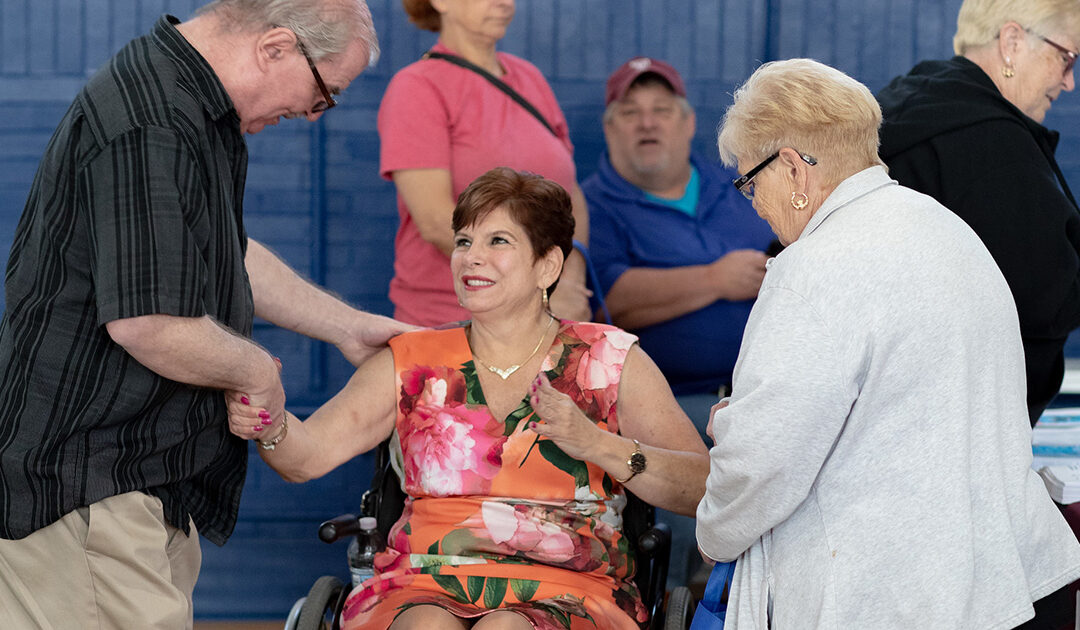
by Christin Brown | October 13, 2022 | News Releases
Philadelphia Pa. − October 13, 2022 − Today nearly 100 seniors, their direct caregivers, and vendors attended the first of three Senior Expos hosted by Senator Christine Tartaglione (D-Philadelphia).
The expo, organized and hosted by Sen. Tartaglione, at the St. Anne’s Rectory PAL Center in Philadelphia hosted representatives from various government agencies as well as public and private providers were on hand to discuss programs and services for older Philadelphians, as well as organizations providing health screenings. A free lunch was provided to attendees as well.
“One of my favorite aspects of being an elected official is helping to connect seniors with the services they need,” Sen. Tartaglione said. “These events are always a huge hit with my constituents, and every time I interact with constituents around the 2nd district, they always tell me how much they love the senior fairs and are already looking forward to the next one.”
Sen. Tartaglione will be hosting two more senior expos in the 2nd District:
- Friday, October 21st, 10 am-1 pm at the Lawncrest Recreation Center, 6000 Rising Sun Avenue, Philadelphia
- Thursday, October 27th, 10 am-1 pm at the Mayfair Community Center, 2990 Saint Vincent St, Philadelphia
The Senior Expos are free to attend and open to all seniors and their caregivers in the 2nd district.
For more information contact Sen. Tartaglione’s district office at (215) 533-0440.
###
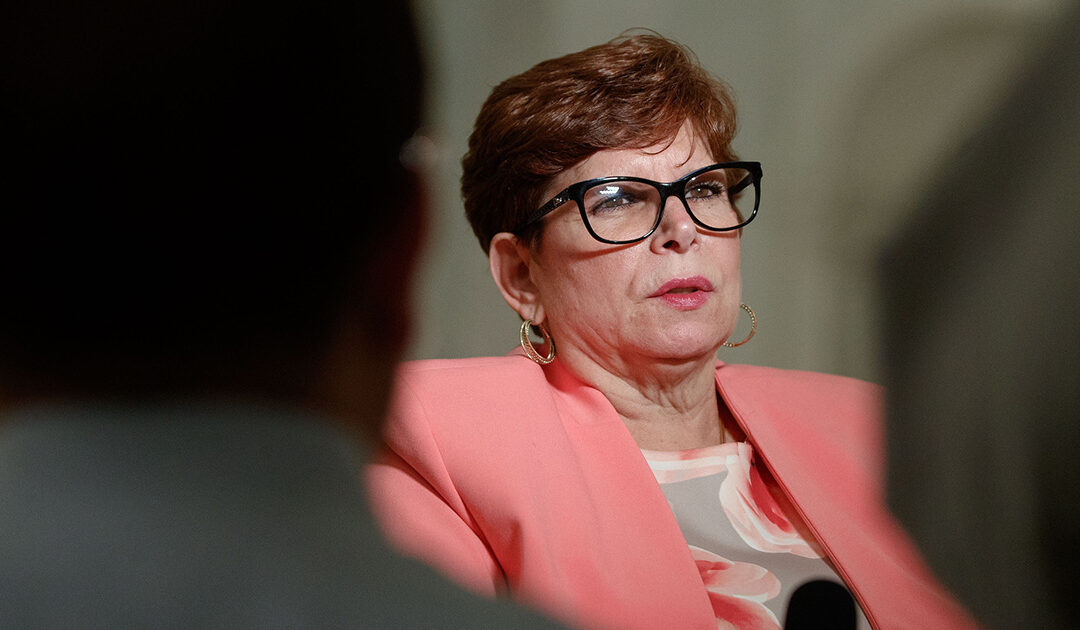
by Christin Brown | July 8, 2022 | feature, News Releases
Harrisburg, PA – July 8, 2022 – On Friday, the Pennsylvania General Assembly passed the $44 billion Fiscal Year 2022-2023 (FY 22-23) Budget and related code bills, which are awaiting Governor Wolf’s signature.
“This budget is both a great step forward in its historic investment in education funding, with a record $1.1 billion increase in education funding and $190 million heading to the School District of Philadelphia. It was also a missed opportunity to make meaningful and substantive change in Pennsylvanians’ lives – we failed to raise Pennsylvania’s minimum wage or close the Delaware loophole, and we redirected gaming revenue away from helping Pennsylvanians afford their property taxes and toward Pennsylvania’s General Fund,” said Senator Christine Tartaglione.
House Bill 1342, the Pennsylvania Tax Code for FY 22-23, which Sen. Tartaglione voted ‘NO’ on, will slowly lower the Corporate Net Income Tax (CNI) from 9.99% to 4.99% in 2031. It failed to address the needs of employees earning an inadequate minimum wage or close the Delaware loophole which would prevent corporations from moving profits to subsidiaries in neighboring Delaware and not paying their fair share in taxes.
“150 days ago, Governor Wolf delivered his final Budget Address to the General Assembly. During his Address, he spoke about the need to address the CNI but doing so while raising the minimum wage and closing the Delaware loophole. But today, the majority party lowered the CNI while leaving behind the lowest earners in Pennsylvania.” said Sen Tartaglione.
Other programs and initiatives receiving funding include investments of $125 million for the Whole Home Repair program, $100 million for Adult Mental Health Support, $90 million for Childcare Assistance, and $75 million for Violence Intervention and Prevention Programs.
A more detailed breakdown of Pennsylvania’s FY 22-23 budget can be found here.
###
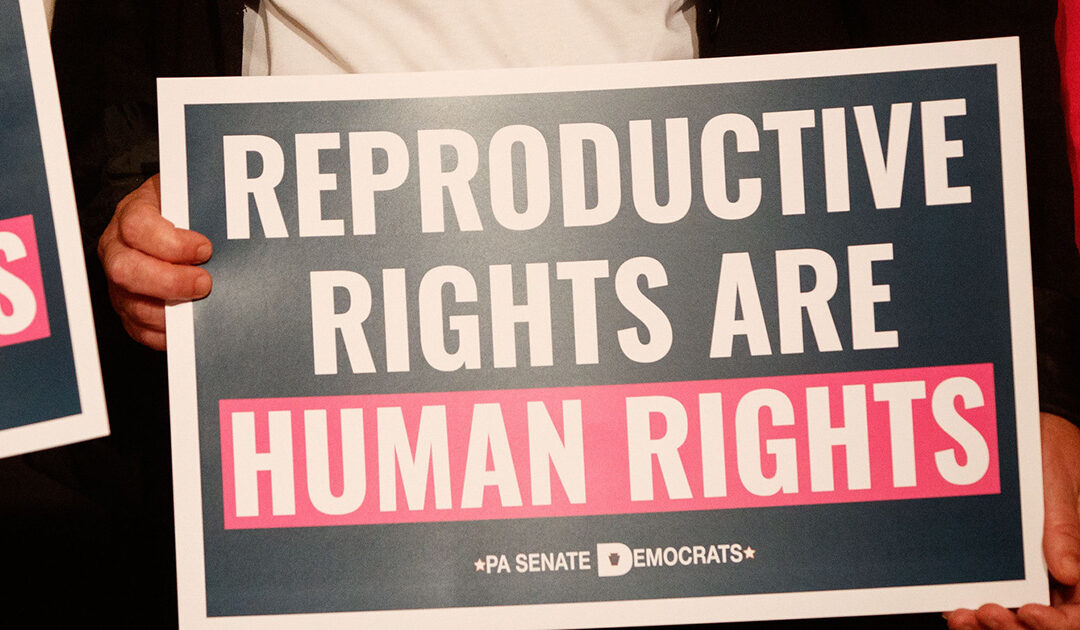
by Christin Brown | June 27, 2022 | feature, News Releases
HARRISBURG, June 27, 2022 − Seven members of the Pennsylvania Senate Democratic Caucus circulated a memo on Friday afternoon to take steps to codify into state law the personal right to make decisions about health and reproduction, including access to safe and legal abortions.
The co-sponsorship memo was circulated by state Senators Katie Muth (D- Montgomery/Chester/Berks), Amanda Cappelletti (D-Montgomery/Delaware), Lindsey Williams (D-Allegheny), Maria Collett (D-Bucks/Montgomery), Judy Schwank (D-Berks), Christine Tartaglione (D-Philadelphia), and Carolyn Comitta (D-Chester).
“The Supreme Court decision handed down on Friday was not made in the interest of the people and shows that the highest court in our nation has a majority that is being run by harmful right wing special interests,” Muth said. “If we cannot trust the Court to protect the rights of Pennsylvanians, then it is up to us in the state legislature to defend our rights to make decisions about our own bodies. We cannot and we will never back down in the fight to protect our rights, our bodies, and our right to choice.”
The legislation comes on the heels of the devastating ruling handed down by a partisan Supreme Court on Friday that overturned the 1973 Roe v Wade ruling and eliminates the constitutional right to an abortion after almost 50 years.
“Codifying Roe will go a long way to protect the right to determine our own bodily autonomy here in the Commonwealth. Currently, the right to make decisions about our own bodies is under threat because extremists refuse to accept the reality that abortion is a necessary and vital health care procedure,” Cappelletti said. “We must do all that we can to protect and even expand access, and this legislation is the first step to doing so.”
In 1973, the U.S. Supreme Court ruled in Roe v. Wade that abortion rights being left to the individual states was a violation of the right to privacy and equal protection under the law. This ruling had provided American women the reproductive freedoms and personal health choices they deserve as equal citizens.
“Last week’s Supreme Court ruling took away the federal right for millions of Americans to seek life-saving reproductive healthcare. Abortion is only legal in Pennsylvania right now because the anti-choice bills run by Republicans in the legislature have been vetoed by the governor. The time is now to codify Roe into state law to ensure that reproductive healthcare remains safe and accessible for future generations,” Williams added. “Deciding if, when, and with whom to start or grow a family is a human right. I trust people to make the best decisions about their lives, families and their healthcare. This legislation is about our right to privacy and our right to bodily autonomy and I am proud to support it.”
In the dissenting opinion filed on Friday, Supreme Court Justice Stephen Breyer wrote that “withdrawing a woman’s right to choose whether to continue a pregnancy does not mean that no choice is being made. It means that a majority of today’s Court has wrenched this choice from women and given it to the States. To allow a State to exert control over one of “the most intimate and personal choices” a woman may make is not only to affect the course of her life, monumental as those effects might be.”
“After nearly 50 years of legal precedent, we are seeing nothing less than a rollback of our fundamental rights to bodily autonomy. This ruling could be devastating to Pennsylvanians, but it does not have to be,” Collett added. “Our legislature must codify Roe v. Wade and ensure safe, legal, and accessible reproductive care for everyone, regardless of their income level or other social barriers.”
According to April 2022 polling done by Franklin & Marshall College, which has regularly polled on the issue since 2009, only 16 percent of Pennsylvanians believe that abortion should be illegal in all circumstances.
“Without Roe, state legislatures across the country will be lining up to restrict, ban or protect abortion access. Given that only 30% of Pennsylvanians agree with the overturning of Roe, I believe this legislation will do what our constituents expect us to do – protect access to abortion,” Schwank said. “We can’t allow the people of this commonwealth’s personal health care decisions to be made by a vocal minority.”
The Senators all agree that it is up to the legislature to step up and take action to protect women’s freedom of choice.
“While abortion currently remains safe and legal in Pennsylvania, we must take steps to keep it that way. In overturning Roe v. Wade, the Supreme Court showed just how fragile protections for women’s health, women’s rights, and women’s choice are,” Comitta said. “Codifying these protections into law is a matter of representing the majority of Pennsylvania voters who believe abortion should be legal, standing up for all women, and saying no to an extremist agenda of government-mandated pregnancy.”
The Senators indicated that language is currently being drafted to codify the protections of the 1973 Roe v Wade ruling into Pennsylvania law and that it will be introduced soon.
“We just witnessed an unprecedented repeal of the rights of women in America by activist justices acting against the interest of the majority of Americans. Pennsylvania’s legislature needs to act now to ensure we protect the rights of women here in Pennsylvania,” Tartaglione said. “This legislation will ensure women retain the right to safe abortions and protects women from having the government interfere in the private decision-making process between her and her healthcare team.”
Click here to read the co-sponsorship memo that was circulated on Friday.
###
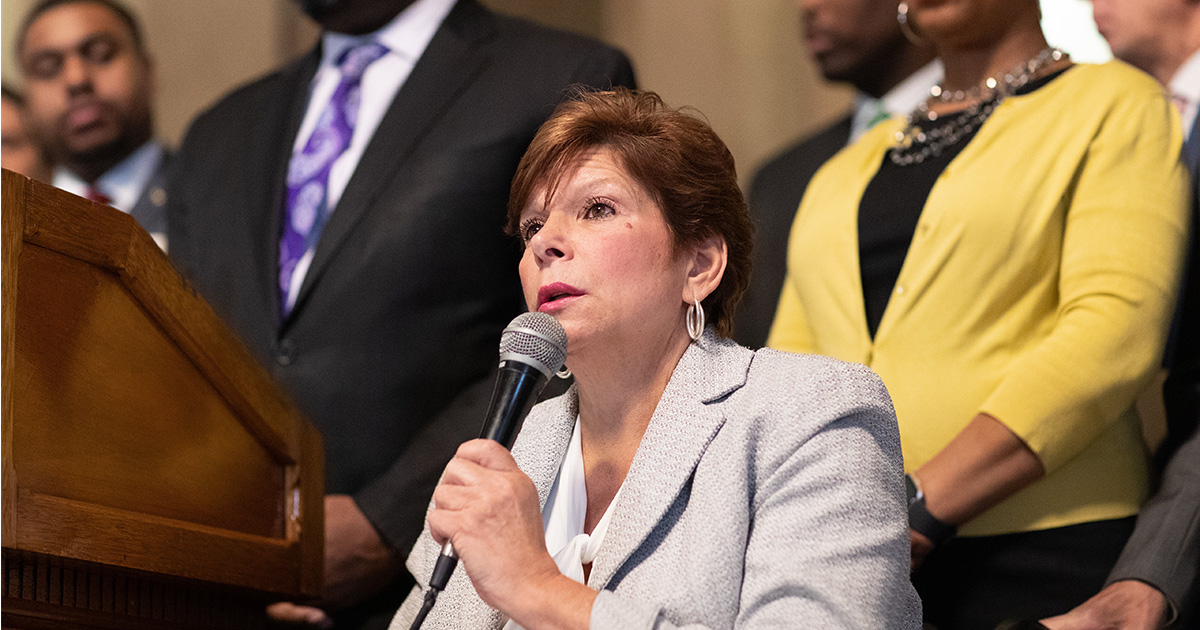
by Christin Brown | June 24, 2022 | feature, News Releases
Harrisburg − June 24, 2022 − Co-chairs of the Pennsylvania Women’s Health Caucus (WHC) and members of the Pennsylvania State Senate Democratic Caucus criticized today’s ruling by the U.S. Supreme Court on Dobbs v. Jackson Women’s Health Organization. The ruling by the court not only upheld a Mississippi law banning abortion after 15 weeks but also goes further and overturns both Roe v. Wade and Planned Parenthood v. Casey, opening the door for states to outright ban or severely restrict abortion.
The ruling eliminates the constitutional right to an abortion recognized by the 1973 Roe v. Wade decision. Since a draft of the opinion written by Justice Samuel Alito was leaked and its authenticity subsequently confirmed by the court, advocacy groups, elected officials, and stakeholders have been issuing dire warnings about what such a radical decision would mean and the detrimental impact it would have on the health of millions of Americans.
After today’s decision, the 13 states that passed trigger laws now have bans or severe restrictions already enshrined into law, leaving millions of Americans without access to abortion immediately. Arkansas, Idaho and Oklahoma law now criminalizes abortion with penalties ranging from 5 to ten years in prison.
“The Supreme Court’s decision is absolutely gutting and a severe blow to women across the country,” said WHC co-chair Sen. Judy Schwank (D-11th). “We have a maternal mortality crisis in the commonwealth and the U.S. that will only be furthered by this reckless and ideologically driven decision. Our goal now needs to be preserving the access Pennsylvanians currently have to reproductive health care that will no doubt be subject to renewed attacks in the state legislature.”
“The overturning of Roe v. Wade is a devastating decision that will impact millions of women and child-bearing individuals across the country,” said WHC co-chair Sen. Amanda Cappelletti. “Women and child-bearing individuals are not second-class citizens. Bodily autonomy is a human right and abortion is still legal in Pennsylvania. I will do everything in my power to ensure it stays that way here in our commonwealth.”
“Despite today’s decision, here in Pennsylvania, we have to ensure that we maintain the right to legal and safe abortion access and that we continue fighting for women and families across the state for this option,” said WHC co-chair Rep. Morgan Cephas (D-192nd). “Limiting access to abortion healthcare will only exacerbate the maternal health care deserts that we’ve seen across our state and worsen the burden of the decisions that women and families need to make during this challenging time in their lives.”
“This decision is not only an extreme disappointment, but it is completely out of step with what the majority of Americans support, including here in Pennsylvania,” said State Senate Democratic Leader Sen. Jay Costa (D-43rd). “When reproductive rights are threatened, women’s health care on all levels is at risk. Instead of restricting health care for women, Senate Democrats are committed to making the healthcare system work even better for women and their specific health needs. Instead of stripping women of their rights and opening the door for others to lose fundamental rights as well, Senate Democrats will use our positions to identify real health challenges and solutions for women in this Commonwealth. Proactive, unbiased, convenient, and supportive healthcare should easily be a reality for women, and we will continue to make it a priority.”
“It’s a very scary day for our country,” said Sen. Katie Muth (D-44th). “This decision shows that the highest court in the land now includes radical politics into their decision-making process. This is what happens when the bench is stacked by a President who was unfit to serve the public. Now, we must take our anger and turn it into action, and hold every elected official accountable because we will never back down in the fight to protect our rights, our bodies, and our right to choice.”
“While this decision was expected, it is no less devastating,” said Sen. Maria Collett (D-12th). “Without Roe, what happens in the Pennsylvania legislature is more important than ever, and members of the Republican majority have already moved unpopular bills that turn back the clock and effectively ban all abortion. We need to be expanding access to healthcare across our commonwealth, not eliminating it, and I will continue to fight to ensure women can control their own medical decisions.”
“Fundamentally, the SCOTUS’ decision to overturn Roe v. Wade is an attack on every person’s constitutional right to make decisions about their bodies and reproductive health,” said Sen. Tim Kearney (D-26th). “Research shows that limiting access to abortions will cause more harm, inequities, and possibly deaths—especially for the poor and communities vulnerable to health disparities or lack of adequate healthcare. Now Pennsylvania must take the necessary steps to protect abortion rights. The onus will fall on our Commonwealth, and voters this coming election to select candidates whose policy positions align with their own. We must do what we can to ensure that Pennsylvanians continue to have access to safe and legal abortions.”
“To say I am disappointed in this decision would be a tremendous understatement,” said Sen. Carolyn Comitta (D-19th). “This ruling from the Supreme Court is a blatant attack on the personal freedoms, reproductive rights, and access to healthcare of women across the nation. Abortion is healthcare. Decisions women make about their own bodies should only be between them and their doctors. Today’s ruling will stand as an organizing call to redouble our efforts to protect reproductive rights and access to vital women’s healthcare in Pennsylvania and across the U.S.”
“I am appalled and disappointed in the Supreme Court for overturning decades of precedent and nearly overnight rolling back generations of work that had been hard-fought and won,” said Sen. Christine Tartaglione (D-2nd). “Make no mistake, the Supreme Court today did not end abortions in the United States, they ended safe abortions in the United States. We must now continue the fight that so many have been fighting for years and elect pro-choice, pro-women candidates this fall. We must now act to ensure and enshrine in Pennsylvania law the right to access abortion care for all women.”
Collectively, the WHC co-chairs are now expressing the importance of organizing around abortion rights and moving to preserve the access to abortion that is currently available in Pennsylvania.
As of now, abortion remains safe and legal in Pennsylvania, however, Pennsylvania House and Senate Republicans have signaled they will move aggressively to ban or restrict abortion in the commonwealth.
They’re currently floating the possibility of moving a vaguely worded constitutional amendment stating that there is no constitutional right to an abortion in Pennsylvania through both chambers to circumvent a veto. The constitutional amendment could be placed on the ballot as early as the 2023 primary election.
###
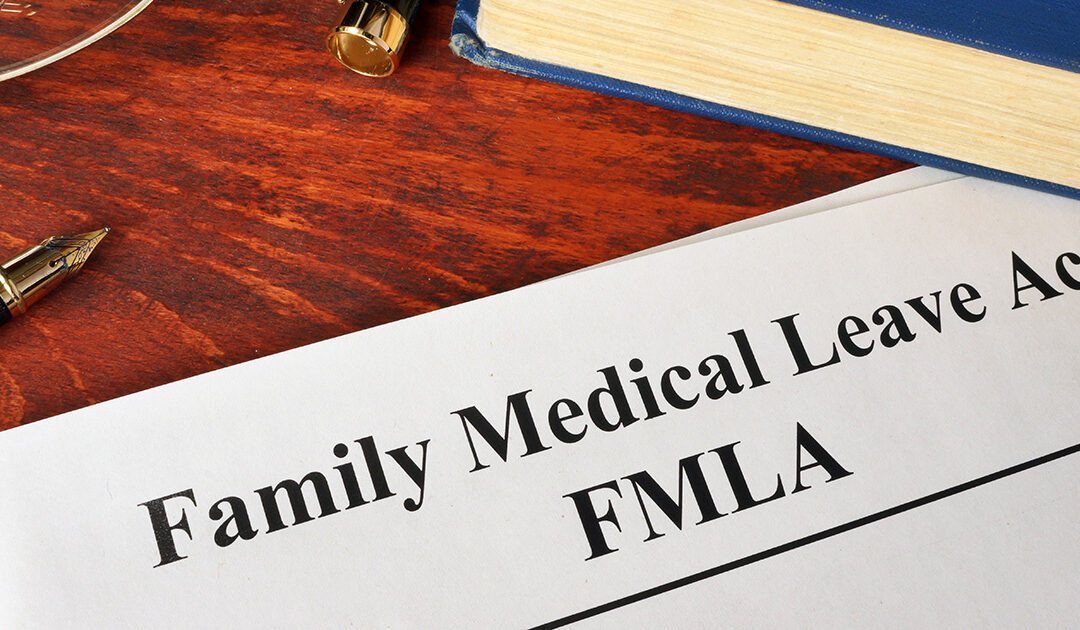
by Christin Brown | June 15, 2022 | feature, News Releases
Harrisburg, PA – June 15, 2022 – Today, Senate Bill 617, legislation sponsored by Senator Christine Tartaglione, which would extend federal Family and Medical Leave Act (FMLA) protections to siblings, grandparents, and grandchildren in certain and specific cases passed the Senate by a vote of 47-3. The passage comes one day after the bill passed the Senate Appropriations Committee unanimously.
“This is an important step forward for the workers of Pennsylvania.” Said Tartaglione. “Ensuring workers can take care of their family and loved ones without having to sacrifice their professional life and career provides workers with the needed assurance that, if need be, they can provide care and support to the people around them without being forced out of the workforce.”
This legislation provides up to six weeks of protected, unpaid leave to an employee so that they may care for a sibling, grandparent, or grandchild with a certified terminal illness if such sibling, grandparent, or grandchild has no living spouse, no child over 17 years of age or no parent under 65 years of age.
This legislation was championed by Anne Marie Pearson since her sister Joanne became terminally ill in 2008. Anne was forced to choose between caring for her sister or keeping her job since she was not covered by the current FMLA rules, and no other family member was able to care for Joanne.
“I want to thank my colleagues for their support of the workers like Anne and their families like Joanne that are in all corners of Pennsylvania. Ensuring workers don’t need to choose between their jobs and their families is good for all Pennsylvanians.” Said Tartaglione.
Senate Bill 617 now heads to the Pennsylvania House for its consideration.
###

by Christin Brown | June 9, 2022 | News Releases
Harrisburg, PA – June 8, 2022 – Today, Senator Christine Tartaglione announced more than $9.2 million will be coming to Philadelphia from the Pennsylvania Commission on Crime and Delinquency (PCCD) to enhance the quality, coordination, and planning of criminal and juvenile justice system, victim service, and community safety programs.
“I am delighted to see the continued investment in all aspects of the criminal justice system here in Philadelphia as well as across the commonwealth,” said Sen Tartaglione. “The funds will be heading to organizations that are at the forefront of addressing our community’s biggest needs including – mental health resources, child advocacy centers, treatment programs for people experiencing addiction, and more.”
Grants that received funding were submitted to the PCCD and reviewed by the Children’s Advocacy Center Advisory Committee (CACAC), the County Adult Probation and Parole Advisory Committee (CAPPAC), or the Juvenile Justice and Delinquency Prevention Committee (JJDPC).
Programs that serve the residents of Philadelphia that received funding today include:
CACAC – Endowment Act Funds
- $100,000 – Philadelphia Children’s Alliance
- $100,000 – Joseph J. Peters Institute
- $271,423 – WOAR-Philadelphia Center Against Sexual Violence
- $100,000 – Philadelphia Children’s Alliance
- $4,130,000 – Philadelphia City Treasurer
CAPPAC – 2022-2023 Intermediate Punishment Treatment Funds
- $4,018,618 – Philadelphia County
JJDPC – State Substance Abuse Education and Demand Reduction Fund
- $150,000 – Anti-Drug & Alcohol Crusaders, Inc.
- $150,000 – Caring People Alliance
JJDPC – State Violence and Delinquency Prevention Funds
- $150,000 – Oxford Circle Christian Community Development Association
More information on PCCD and its grant opportunities can be found on its website.
###
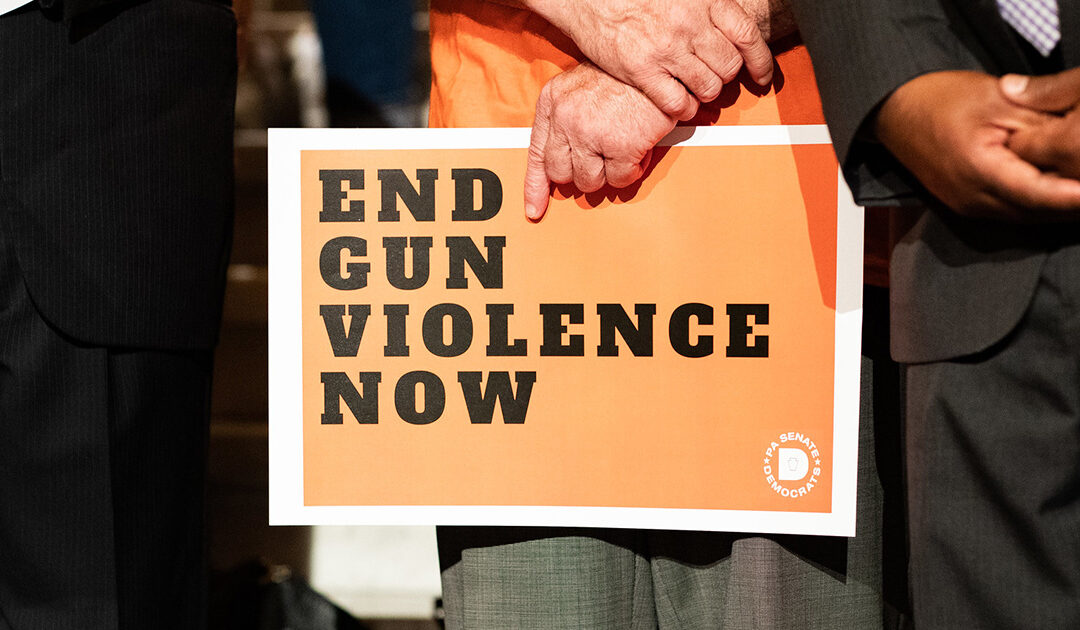
by Christin Brown | May 25, 2022 | News Releases
HARRISBURG – May 25, 2022 – Today, Pennsylvania Senate Democrats wrote the following letter to Republican leaders in response to rampant gun violence and mass shootings that have become too common in the United States. Just this year, 215 mass shootings have taken place in the country, with the devastating shooting that occurred at Robb Elementary School in Uvalde, Texas on May 24, 2022, being the 215th.
In the letter, the caucus calls on the Republican majority to act on “reasonable and responsible legislation and appropriations” that does not infringe on Second Amendment rights but will help keep guns away from bad actors and support gun violence prevention. Senate Democrats list seven bills that have been introduced to mitigate gun violence but have sat in committee with no discussion or votes. They also highlight how American Rescue Plan dollars and Pennsylvania’s current budget surplus can be used to help communities prevent horrific violence.
 Loading...
Loading...

by Christin Brown | May 19, 2022 | feature, News Releases
Harrisburg, Pa. − May 19, 2022 − State Senators Maria Collett (D-12 Montgomery/Bucks) and Tina Tartaglione (D-2 Philadelphia) will soon introduce legislation to make commonsense improvements to our outdated Unemployment Compensation (UC) laws and allow claims to be processed faster.
“Since the onset of COVID-19, my office has helped thousands of constituents navigate an overwhelmed unemployment system,” said Senator Collett. “The pandemic exposed many problems with Pennsylvania’s UC system, some which will require time, money and bipartisan agreement to correct and others – like abolishing the waiting week – that can be quickly resolved by simply cutting through the red tape. I’ve heard directly from my constituents how eliminating the waiting week could help their families. Pennsylvanians contribute to the unemployment system every time they clock in for their shift – they deserve a UC system which works for them right away because bills don’t disappear as quickly as work can.”
As Pennsylvania’s unemployment rates continue to decline and stress on the UC system eases, now is the time to conduct reviews and make changes to ensure residents can access the benefits they are entitled to.
“It’s no secret that Pennsylvanians need help. Our Commonwealth’s Unemployment System helps struggling families to put food on the table and keep a roof over their heads,” said Senator Tartaglione. “This commonsense legislation will remove the roadblocks and red-tape that keep our neighbors from accessing help in a timely manner.”
Collett & Tartaglione’s bill will address some of the most common roadblocks in the UC claims process by:
- Permanently eliminating the “waiting week” that makes claimants ineligible for benefits during the first week of unemployment.
- Eliminating credit weeks from the process of verifying income, which too regularly causes delays in benefits and confusion amongst employers and claimants.
- Eliminating severance pay requirements to minimize the occurrence of claims being sent to UC examiners for review, which further delays claims processing.
- Streamlining the Shared Work Program to help claimants access benefits in a timelier manner.
- Improving the stability of the UC Trust Fund by aligning the solvency definition and trigger percentage with federal policy.
This is companion legislation to HB 549, introduced by Representatives Gerald J. Mullery and Liz Hanbidge.
###

by Christin Brown | April 22, 2022 | feature, News Releases
Philadelphia, Pa., – April 22, 2022 – Senator Christine Tartaglione (D-2) announced today that $11.75 million in Redevelopment Assistance Capital Program (RACP) grants are being awarded to projects across Philadelphia.
“The projects awarded grants today will benefit the residents of Philadelphia and the surrounding communities from all walks of life,” said Sen. Tartaglione. “From expanding educational access and medical care to addiction recovery services, these grants will help better countless lives and continue to grow our local economy, and I am honored to have advocated for each and every one of them.”
The RACP grant process is highly competitive, and only a small number of applications are funded. Programs receiving funding include:
- Albert Einstein Healthcare Network – $1,000,000 to renovate space to include apartments for overnight stays. Space will be outfitted to provide intensive outpatient care for former military personnel, first responders, and retired professional athletes who have sustained traumatic brain injuries.
- Impact Services- $2,500,000 to develop the A & Indiana Campus including renovation of an existing 150,000 SF Mill Building into mixed-use spaces including affordable housing and a multi-tenant community serving building. The property will be renovated subject to Historic requirements and fit out for the identified tenants. The renovations will include all new systems, floors, historic windows, roofing, elevators, stairs, and finishes. The project will also include completion of site work and parking for access to the building.
- New Kensington Community Development Corporation – $1,500,000 to acquire 8 properties in a 0.75-mile stretch of Kensington Avenue and transform them into avenue “anchors”. Plans include the renovation of 3000 Kensington and 3134-36 Kensington, which each have existing buildings; 2964 and 2968 Kensington Avenue to allow these vacant lots to be used for outdoor programming; and 2713-2719 Kensington Avenue so it can serve as a gateway to the Avenue, a plaza for artists and entrepreneurs, and an access point to the future Richmond Industrial Trail.
- Drexel University – $1,000,000 to create and consolidate spaces for Drexel’s College of Nursing and Health Professions and the teaching functions of the College of Medicine to the University City campus and fund improvements to St. Christophers Hospital.
- Nueva Esperanza, Inc.—$3,000,000 to build a new elementary school to provide a high-quality educational experience for up to 800 students from kindergarten to fifth grade.
- Temple University Hospital, Inc.—$1,000,000 to renovate vacant space on the TUHEC campus to expand services available for treating addiction in multiple levels of care.
The Redevelopment Assistance Capital Program (RACP) is a Commonwealth grant program administered by the Office of the Budget for the acquisition and construction of regional economic, cultural, civic, recreational, and historical improvement projects.
###

by Christin Brown | April 14, 2022 | feature, News Releases
Philadelphia – April 14th, 2022 – Today, State Senator Christine Tartaglione (D-2) announced three Northeast Philadelphia organizations were awarded $75,000 in Nonprofit Security Grant Program funding from the Pennsylvania Commission on Crime and Delinquency (PCCD).
“An investment in the safety and security of our communities is an investment in our collective future,” said Sen. Tartaglione. “I am thankful to the governor for prioritizing these organizations and ensuring the safety of those that live, worship, and congregate in our city and across our state.”
The three organizations in Northeast Philadelphia awarded funding are:
- Northeast Philadelphia Development Corporation, $25,000
- Northeast Philadelphia Chinese Association of CultureTrust Greater Philadelphia, $25,000
- Philadelphia Chinese Chamber of Commerce, $25,000
The grants awarded are a part of a larger funding announcement that will send more than $650,000 to 21 organizations across the City of Philadelphia and $5.23 million to 120 churches, synagogues, mosques, temples, and other nonprofit organizations across the state.
Organizations can receive funding for safety and security planning, safety and security equipment and technology, training, building upgrades, vulnerability and threat assessments, and other security enhancements.
More information regarding the Nonprofit Security Grant Fund Program and how to apply can be found on PCCD’s website.
###
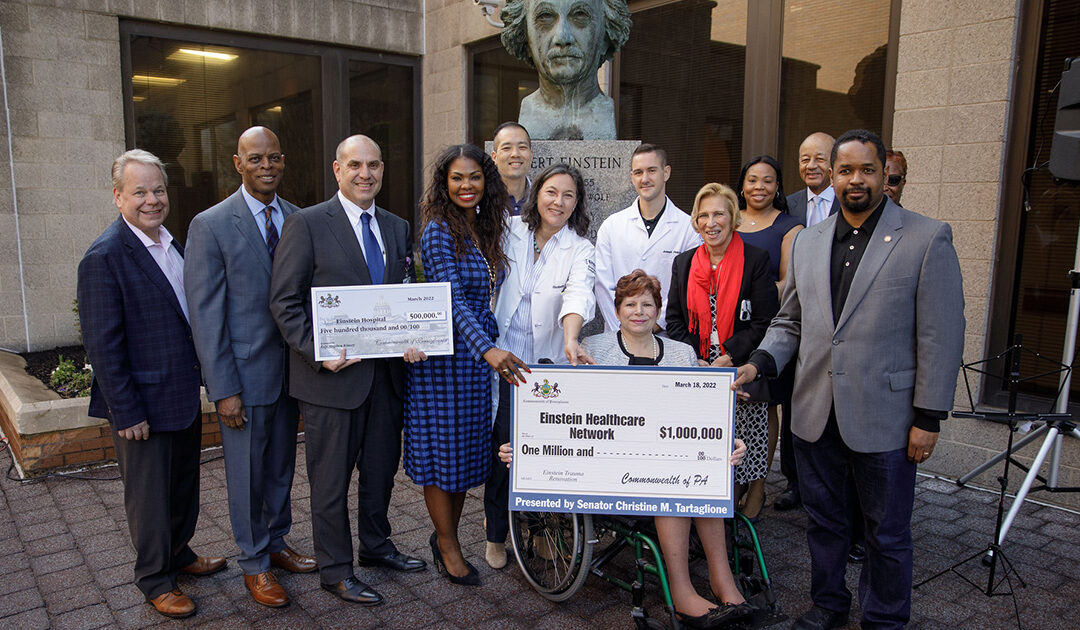
by Christin Brown | March 18, 2022 | feature, News Releases
Philadelphia − March 18, 2022 – Today Senator Christine Tartaglione (D-2) was joined by Senator Sharif Street (D-3) and Representative Stephen Kinsey (D-201) to present officials from Einstein Health Network with a $1 million mock check to expand the Emergency Department at Einstein Medical Center Philadelphia.
The $1 million grant was awarded via the Redevelopment Assistance Capital Program (RACP). RACP grants are awarded to assist in the acquisition or construction of regional economic, cultural, civic, recreational, and historical improvement projects.
“Einstein Medical Center has been a great partner of Philadelphia and our entire region as a whole,” said Sen. Tartaglione. “The grant, which comes from a highly competitive pool of applicants, is going to allow Einstein to continue to be a leader in the medical care of our communities.”
The project will expand the Emergency Department and create a new Observation Unit and Trauma Family Room at the Einstein Philadelphia, which is now a part of Jefferson Health.
“We are tremendously grateful for this support for the construction of our new Einstein Philadelphia Observation Unit and our new Trauma Family Room,” said Dr. Elizabeth Datner, MD, FACEP Chair, Department of Emergency Medicine, Einstein Healthcare Network. “These resources will allow us to continue providing state of the art clinical care for our patients during times when short hospital stays are necessary, and to offer a designated area for concerned family members and loved ones to be together and to consult with care teams during extremely difficult times. Both of these projects will bolster our unfaltering commitment to Einstein’s mission of serving the needs of our community.”
More information about RACP grants awarded and how to apply can be found here.
###
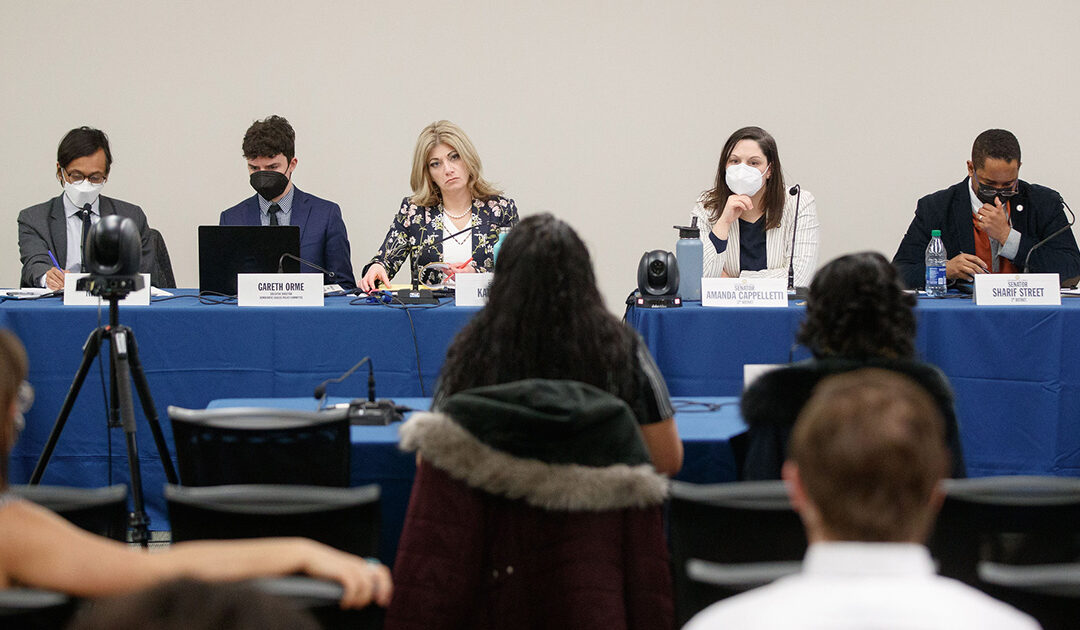
by Christin Brown | March 15, 2022 | News Releases
PHILADELPHIA, March 15, 2022 – State Senator Katie Muth (D- Berks/Chester/Montgomery), Chair of the Pennsylvania Senate Democratic Policy Committee, joined Senators Sharif Street, Nikil Saval, Amanda Cappelletti, Tina Tartaglione and Art Haywood to host a public hearing on housing scarcity and contemporary houselessness yesterday at Temple University.
“We need to tackle the issue of economic injustice – from raising wages to actual living wages and ensuring rent and housing prices are fair, transparent, and flexible according to each individual’s financial situation,” Muth said. “All levels of government need to implement policies that ensure public dollars are actually helping the public, not the wealthy, private real estate and private equity firms making billions off of taxpayer funded subsidies and evicting people who can’t afford to pay skyrocketing rent and housing rates. I hope our hearing and the impassioned testimony provided by actual Pennsylvanians living these challenges forces this conversation into the ongoing budget debate and into all 67 counties and local government priorities.”
The policy hearing featured three panels of participants who presented testimony and discussed personal stories about housing scarcity, houselessness, and the government’s responsibility to provide safe, affordable, and accessible housing in Pennsylvania.
“The recent tragic fire in Philadelphia’s Fairmount community that claimed the lives of 12, including 9 children, began with a failure of government. A family was forced to make the untenable choice of cramming eighteen individuals into a single unit because of a lack of resources. Housing is security and dignity. Years of divestment from every level of government have been an abdication of government’s duty to protect the communities they serve,” Street said. “The fundamental question for society and government is ‘how do we create accessible, safe and affordable housing for all?’ I look forward to joining my colleagues in creating policy to address the critical issue of housing scarcity.”
Testifiers at the hearing included Gail Loney, a North Central Philadelphia resident; Alisha Robinson, a Frankford resident; Kelvin Jeremiah, president and CEO, Philadelphia Housing Authority; Aaron Zappia, Senior Government Relations Manager, Housing Alliance of Pennsylvania; Andrew Frishkoff, Executive Director, Philadelphia Local Initiatives Support Corporation (LISC); and Stephanie Sena, Anti-Poverty Fellow & Housing Advocate, Villanova University Charles Widger School of Law.
“The housing crisis is not unsolvable—we need to act to ameliorate it at every chance we get,” Saval added. “That means raising wages, building equity into our systems, and preserving affordable housing by giving people what they need to repair and maintain and stay in their homes.”
All submitted testimony from the policy hearing and the full video is available at SenatorMuth.com/Policy.
# # #
Testimony
Panel 1: Lived Experience
- Gail Loney, North Central Philadelphia Resident
- Alisha Robinson, Frankford Resident
Panel 2: The Philadelphia Housing Authority
Panel 3: Policy Solutions
Additional Testimony
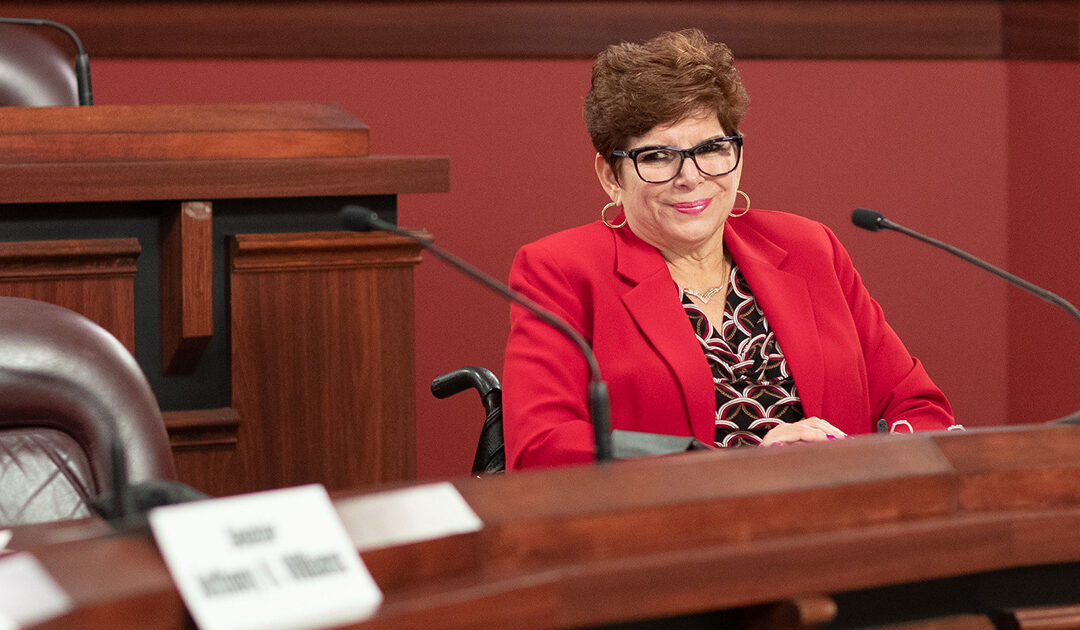
by Christin Brown | February 8, 2022 | News Releases
Harrisburg, Pa. − February 8, 2022 − Senator Christine Tartaglione today praised the historic funding plan that places an emphasis on further funding education and refunding programs that have seen budget cuts in past years.
“This budget proposal from Governor Wolf is a step in the right direction and helps fix generational disinvestment in education and programs that help our Commonwealth’s most vulnerable citizens,” Said Tartaglione. “For one of the first times since coming to the Senate, we have the chance to enact real change with the ability to add billions of additional dollars to our education system.”
“Just like Governor Wolf said, our Commonwealth’s minimum wage is embarrassingly low and our corporate net income tax rate too high. That’s why I have introduced legislation that would address both of those issues. I am passionately fighting to ensure we make the Commonwealth a better place to live, work, and do business, and I hope both of my pieces of legislation will be included in the conversations moving forward.”
More information on the Governor’s 2022-23 budget proposal can be found here.
###

by Christin Brown | January 26, 2022 | News Releases
Philadelphia, January 26, 2022 – Philadelphia based programs focused on curbing violence will receive nearly $15 million in new state funding, state Sen. Christine Tartaglione announced today.
The funds, which are provided through the Pennsylvania Commission on Crime and Delinquency’s School Safety and Security Committee, are part of more than $23 million awarded today at the committee’s meeting in Harrisburg. The funding is intended to prioritize support for effective local intervening and preventive measures to stop gun and group violence that occurs across the state.
“Violence has affected neighborhoods and communities across the City of Philadelphia and the Commonwealth, especially the 2nd Senatorial District,” Tartaglione said. “I am thankful that the governor and his administration see and understand that investments in violence prevention are key in helping to heal communities and address the root causes of violence.”
The Wolf administration recently announced that an additional $15 million in American Rescue Plan funds were added to the program, bringing the state’s investment to $45 million in fiscal year 2021-2022.
“Neighborhood by neighborhood and block by block, these grants will support community level organizations that have worked closely with their neighbors to develop programs that will help combat violence and gun violence across Philadelphia and the Commonwealth,” Tartaglione said.
Projects awarded were chosen through a competitive application process with 340 initial funding requests received.
For detailed information the statewide grant winners, click here.
Philadelphia area organizations awarded grants today were:
African Family Health Organization (AFAHO) – $498,278
Requested funds to support the implementation of the “Safe Havens and Mentorship Program” a pilot violence intervention and prevention program for African and Caribbean immigrant and refugee (ACIR) boys and young men between the ages of 16-22 in the greater Philadelphia area. AFAHO will offer a safe-haven at its office location where 20 boys and young men from the ACIR communities will engage in academic tutoring and mentoring; counseling to build trust and understanding; life skills training; developing conflict resolution and de-escalation skills; how to function in a professional work environment and vocational training with tradesmen (general construction, auto mechanics, IT, and electrical) from the community who will serve as both mentors and teachers for their apprentices.
Anti-Violence Partnership of Philadelphia – $1,371,489
Requested funds expand its Counseling Center (CC), Youth Violence Outreach Initiative (YVO), Victim/Witness Services (VWS) and administrative infrastructure to serve more Philadelphians in areas hardest hit by gun violence (Police Districts 12, 16, 18 and 19). Funds will support salaries and benefits for therapists, victim advocates, and other personnel; consultants; laptops for new staff; furniture for new staff; supplies; sound reducing panels; staff/client SEPTA travel passes and other transportation expenses (e.g., parking); and indirect costs.
Children’s Hospital of Philadelphia (CHOP) $1,119,262
The Violence Intervention Program (VIP) at Children’s Hospital of Philadelphia (CHOP) requested funds to support the continuation and expansion of its Hospital Based Violence Intervention Program (HVIP). CHOP’s violence intervention and trauma support services are comprised of three trauma-informed program interventions: intensive case management; mental health therapy; and peer-led psychoeducational peer groups. A portion of requested funding (“Maintenance Funding”) will allow VIP to continue to provide current services to youth and families in Philadelphia, and to evaluate those services with accuracy and rigor. The remainder of requested funding will increase VIP’s reach to a larger number of youth and families (“Expansion Funding”) through CHOP’s Philadelphia-based primary care practices.
City of Philadelphia – Managing Director’s Office $2,000,000
Requested funding to expand the City’s Group Violence Intervention (GVI) strategy, which employs law enforcement and social services to engage individuals at the “highest risk” of gun violence involvement. Funds would support costs associated with one Citywide Caseworker Supervisor and 12 Caseworkers deployed across the Southwest, South, Central, Northwest, and Northeast Divisions as well as the addition of a Law Enforcement Specialist position to enhance coordination and cooperation among law enforcement agencies. Funding would also support costs associated with transportation (leasing GVI MCIT vans) as well as the development and implementation of a comprehensive communications strategy for GVI (full-time communications specialist) to provide a counter-messaging campaign to compete with the rising number of online disputes that lead to gun violence.
Concilio De Organizaciones Hispanas – El Concilio $475,000
Requested funding to support the implementation of Safe Haven services to 250 young adults (16-24 years old). Funds will support staffing a Program Coordinator and two Workforce Development Case Managers, and support personnel; cover a contracted Behavioral Health psychologist/therapist; incentives for 75 internships; operations (supplies, program materials, laptops/cellphones, facilities); and indirect costs. Concilio proposes to incorporate interventions in gun violence prevention that address economic inequities through workforce development training, support services, low social mobility through educational improvement (completion of high school, GED, collegiate or vocational studies), economic opportunities with work experiences and internships, behavioral support through trauma-informed intervention mental health for individuals and families and social services referral.
CORA Services Inc. $726,432
The Good Shepherd Mediation division of CORA Services will receive funds to actualize a two-tiered program that mitigates gun and group violence by empowering neighborhoods with high volumes of assaults to resolve conflicts using mediation, restorative justice, and community dialogue. The program will host a recurring six-month Restorative Justice course that prepares youth in these neighborhoods to become mediators, restorative justice facilitators, and community organizers while simultaneously providing the respective neighborhoods with Restorative Justice services.
The Education Culture Opportunities (ECO) Foundation $150,000
The Education Culture Opportunities (ECO) Foundation requested funding to support youth and young adult workforce development initiatives that train Energy Management Specialists (EMS) to work directly with school- aged youth in managing their emotions, actions, power, energy, and ultimately improving their conflict resolution skills. Trained EMS are young adults who intervene with the demographic of those that are most prone to gun violence involvement. Funds will support young adults to experience more meaningful and desirable workforce development opportunities. They will get on-the-job training, be fairly compensated at $18 an hour, and gain transferable skills for the current job market.
EducationWorks (PowerCorpsPHL) $2,000,000
PowerCorpsPHL (PCPHL), operated by EducationWorks, requested funding to provide innovative paid work experiences and supportive services that lead to career pathway jobs for young Black and Latinx Philadelphians who experience barriers to quality employment related to court involvement, lack of postsecondary education and work experience, and the effects of poverty. PCPHL has two tracks that both lead to career training:
- direct entry into full-time, paid work experience through crew-based AmeriCorps service in Philadelphia communities, or
- for court-involved individuals, more rapid entry through the preparatory TRUST program, which provides part-time paid work experience and robust supportive services that can lead to subsequent AmeriCorps crew enrollment.
Father’s Day Rally Committee – $75,000
Father’s Day Rally Committee, Inc. requested funds to support the implementation of “Fathers On A Mission” program to offer support to fathers that lose loved ones to gun violence. Funds will support the cost of a part-time case worker; part-time administrative assistant; and part-time program manager; and include supplies to support their work, including laptops and cellphones. The organization will provide fathers with the skills and tools to overcome the trauma allowing them to create interaction with members of their families and community to share their experience to help reduce levels of violence.
House of Umoja – $150,000
The House of Umoja requested funds to support the implementation of the Umoja Intentional Community, a model multi-tiered community outreach and youth leadership initiative that creates a violence-free zone of Carroll Park community; executes block by block; provides resource triage; mobilizes block captains as advocates for block members who identify families in need while also identifying resources block members may provide to the community; provides sanctuary space for block captains and block members to voice their needs and devise solutions; gives voice to young adults age 15-25 to layout a blueprint for their future through youth editions of Umoja magazine; implements “Planting Seeds of Peace” messaging campaign throughout Carroll Park in partnership with local stores and restaurants; hosts a yearly hybrid Healing Conference bringing stakeholders, community members, youth age 15-25, and wellness and behavioral health practitioners; and has an urban peace corps of students enrolled in 11th and 12th grades trained via the Fattah Peace Corp Academy, a 12-week leadership after-school program. Funds will support the development and training costs of block captains, stakeholders, youth ambassadors, consultants and resource triage workers; cover the cost of part- time consultants, including a Program Director and two Social Workers; as well as supplies to support the work.
Impact Services – $1,500,000
Impact Services requested funds to launch an Anti-Violence Program that connects to its existing community engagement and workforce development programming. Funds will support:
- Direct Outreach/Engagement by hiring a cohort of Kensington residents with lived experience who will engage at-risk young adults (ages 18-34) who are actively or recently engaged in activities that put them at risk of gun violence
- Structured Mentoring at individual and group levels
- Job Placements & Paid Training Programs
- Leadership Development & Community Projects
- Arts & Creative Self-Expression as a tool for engaging and building community; coping with personal and community-based trauma; celebrating individual and community talent and cultures.
North Central Victim Services – $481,019
North Central Victim Services requested funds for the Positive Alternatives for Trauma and Healing (PATH) Program. This program targets youth ages 14-24 and their families living in the Strawberry Mansion and Kensington communities who are at risk for experiencing trauma by promoting positive alternatives to violence through developmentally based mentorship, outreach, making connections, and providing supportive services. Neighborhood mentors will work with youth and their families to support positive relationships and identity additional services that promote not only personal resiliency for the youth but family resilience. In addition, Neighborhood mentors will provide opportunities to get out of the neighborhood to expose the youth to experiences outside of their regular lives in order to increase their worldview and broaden their horizons.
Opportunities Industrialization Center (OIC), Inc. $1,393,106
Philadelphia Opportunities Industrialization Center (OIC) requested funds to support the expansion of its Reentry Services program to assist adults ages 25 years of age or older who were formerly incarcerated in the adult criminal justice system and released from prison or jail within 180 days of program enrollment. Funds will be used to support adults with a history of involvement in the adult criminal justice system acquire industry- recognized credentials, obtain and retain living wage jobs and remain free of criminal justice system involvement. This includes covering the cost of Occupational Skills Trainings; Supportive and Emergency Services; Legal Services; Participant Stipends & Incentives; Program Supplies; Staff Professional Development; Program Marketing/Advertising; as well as Occupancy for Program/ Office Space. Funds will also cover the cost to hire additional program staff to support the program including a Program Coordinator, two Case Managers, an Outreach Coordinator, and an Employment Specialist; and will also include supplies to support their work, including office supplies and laptops. OIC will also budget to cover contractual costs for Domestic Violence/ Trauma & Abuse Specialists and Licensed Therapists.
Philadelphia Department of Public Health $719,019
The Philadelphia Department of Public Health requested funds to support a newly formed collaborative of hospital-based violence intervention programs. Philadelphia has six level 1 trauma centers which vary in the availability of hospital-based violence intervention programs (HVIPs). Funds will support the formation of a team with the singular aim of increasing recruitment for individuals injured by a gun by tracking numbers of eligible patients citywide and developing a central recruitment and referral strategy. This includes direct funding for programs to support the expansion of their work of recruitment and data collection. A citywide, centralized effort to facilitate timely support of those with injury from firearm violence has potential to not only reduce subsequent exposure to violence, but also to increase access to mental health support, employment, legal support, and other services. Centralizing this effort allows for data sharing, tracking of relevant outcomes, and implementation of best practices across institutions.
Temple University Hospital Trauma Department – $961,500
Temple University Hospital, Inc requested funds to support the implementation of the Comprehensive Response to Violence (CRV) project, a hospital-based violence intervention program that will aim to mitigate the effects of community violence by:
- supporting violently-injured patients’ emotional needs immediately following their victimization,
- quickly linking them to a broad network of victim service agencies, and
- providing them high-quality mental health services.
Funds from the two-year grant will cover the salary and benefits for three full-time hospital-based Victim Advocates, two part-time hospital-based Victim Advocates, and one dedicated Trauma Psychologist; support training costs for the Victim Advocates; and include supplies to support their work, including a laptop computer.
University of Pennsylvania – Penn Injury Science Center (PISC) – $1,267,032
The PISC, Penn Trauma, and strategic community partners requested funds to develop and evaluate a collective impact partnership to support community-engaged, evidence-based violence prevention in West/Southwest Philadelphia. This includes
- convening the PHIGHT network (Philadelphia’s Hub to Reduce Interpersonal Violence, Gun Violence, Homicide and Trauma) to align a collective vision, shared metrics, and mutually reinforcing activities;
- identifying a cohort of 40-65 adults and young adults at highest risk for future involvement in gun violence for focused intervention using data systems (i.e. Philadelphia CARES, Shooting Dashboard, Penn Trauma registry), the PHIGHT network, and knowledgeable community partners; and
- implementing and evaluating trauma-informed violence interruption services and tailored assistance from community-based organizations including short and long-term conflict resolution and goal support for the cohort.
###
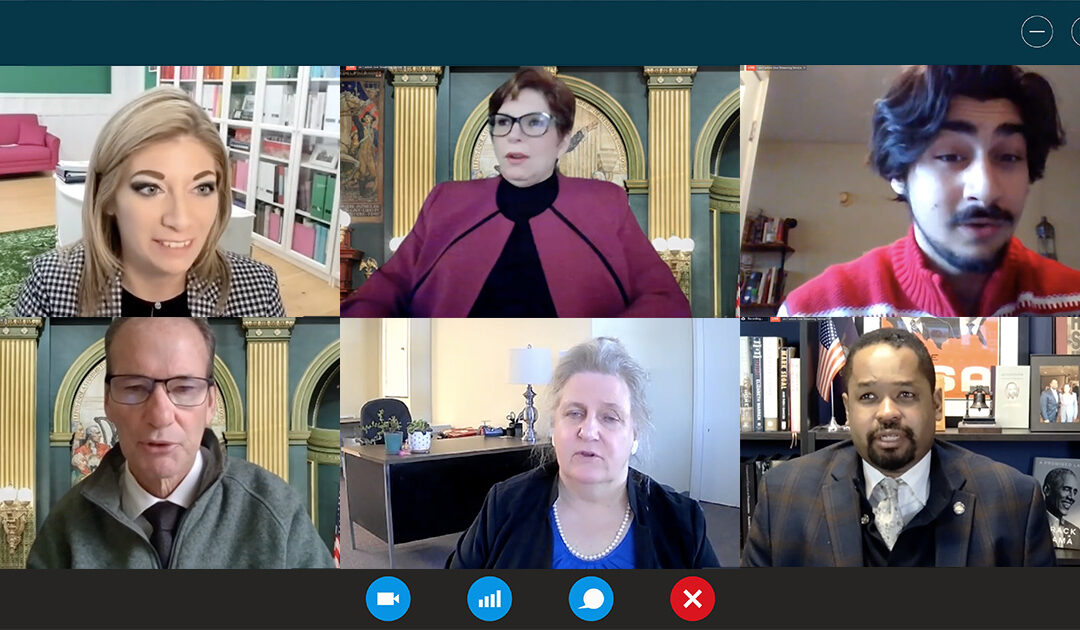
by Christin Brown | January 20, 2022 | feature, News Releases
HARRISBURG, January 20, 2022 – State Senator Katie Muth (D- Berks/Chester/Montgomery), Chair of the Pennsylvania Senate Democratic Policy Committee, today joined Senator John Kane (D-Delaware/Chester) and Senator Christine Tartaglione (D-Philadelphia) to host a virtual public hearing on the recovery challenges associated with substance use disorder.
“Today’s hearing was an opportunity to hear about what we are currently doing here in Pennsylvania and whether our current treatment system is providing positive outcomes for those in recovery from substance use disorder – and more importantly, if it is not working, how can we improve our systems and programs,” Muth said. “We need to ensure that the Commonwealth and our treatment and recovery programs are effective and are providing the best means for sustained, lifelong recovery.”
The virtual policy hearing featured three panels of expert testimony that focused on funding issues faced by the recovery community; the oversight of recovery houses in Pennsylvania; and the challenges with relapsing during recovery from substance use disorder.
“This issue is personal for me – I’ve been sober for almost 40 years. And I know firsthand how difficult recovery is,” Kane said. “Individuals in recovery are facing massive challenges. But as legislators, we have the chance to make that journey a little bit easier. I’m grateful to all the panelists who testified at today’s hearing, and I’m looking forward to getting to work to make sure safe and effective recovery options are available for everyone.”
It is estimated that Pennsylvania is set to receive up to $232 million of the $26 billion global opioid settlement in 2022 and up to $1 billion total over the next 18 years. Of that funding, nearly 70 percent of all funds will be distributed to county authorities to fund initiatives that include medication-assisted treatment, naloxone distribution and services for pregnant and parenting persons suffering from opioid use disorder.
“Having been in recovery for more than 18 years, I know first-hand how important it is to ensure people in recovery have the resources they need as soon as they reach out for help,” Tartaglione added. “The 2nd Senatorial District is no stranger to the challenges substance abuse brings. My community, Philadelphia, and Pennsylvania as a whole need to know that there are elected officials that are dedicated to helping end substance abuse and to expanding access to treatment. The hearing today has helped to open people’s eyes to how crucial timely treatment is.”
Testifiers at today’s hearing included Jennifer Smith, Secretary, PA Department of Drug and Alcohol Programs (DDAP); Bill Stauffer, Executive Director, Pennsylvania Recovery Organizations Alliance (PRO-A); Deb Beck, President, (Drug and Alcohol Service Providers Organization of PA (DASPOP); Jessica Molavi, Clinical Manager of Specialty Programs at Mirmont Treatment Center; and Adam Al-Asad and Sarah Laurel from Savage Sisters Recovery.
All submitted testimony from today’s hearing and the full video is available at SenatorMuth.com/Policy
# # #
Testimony
Panel 1: Recovery Funding
Panel 2: Oversight of Recovery Houses
Panel 3: Chronic Relapsing
Additional Written Testimony

by Christin Brown | January 14, 2022 | Advisory
ROYERSFORD, January 14, 2022 – State Senator Katie Muth, chair of the Pennsylvania Senate Democratic Policy Committee, will join Senators John Kane and Christine Tartaglione to host a virtual public hearing next Thursday at 10 a.m. to discuss recovery challenges associated with substance use disorder.
The hearing will be held Thursday, January 20 at 10 a.m. on Zoom. Interested participants can register in advance by clicking here.
The policy hearing will feature testimony from three panels of experts that will discuss the challenges facing individuals in recovery from substance use disorder. The panels will include representatives from state agencies, treatment clinics, and local recovery houses who will each discuss their specific needs and challenges.
The hearing will also be livestreamed at SenatorMuth.com/Policy and on Senator Muth’s Facebook page.
Media participation is encouraged.
# # #
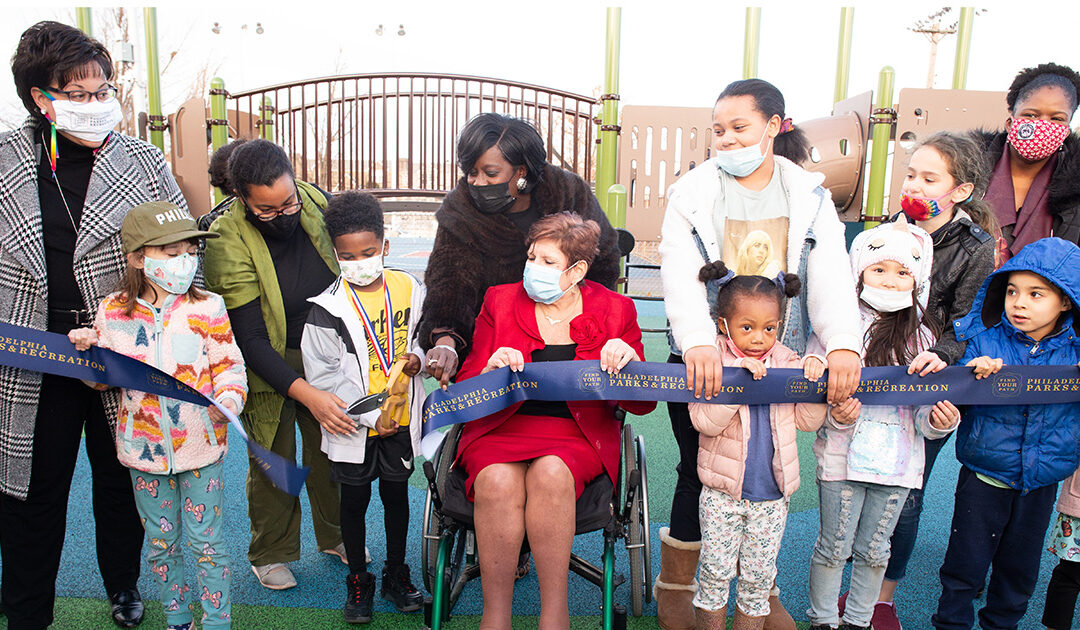
by Christin Brown | December 20, 2021 | feature, News Releases
PHILADELPHIA – December 20, 2021 − State Senator Christine Tartaglione was joined by Philadelphia Parks & Recreation (PPR), Councilmember Cherelle Parker (9th District), and Representative Jared Solomon’s Office, to celebrate the opening of new basketball and futsal courts and toddler playground at Tarken Recreation Center in Oxford Circle.
“The Tarken Rec Center has been an important part of the Oxford Circle neighborhood as well as the Greater Philadelphia community for decades,” said Senator Christine Tartaglione. “The renovations to the basketball and futsal courts as well as the playground are a shining example of the greatness of Philadelphia parks.”
“Parks & Rec is working hard to expand access to athletic recreation for our city’s youth,” said Philadelphia Parks & Recreation Commissioner Kathryn Ott Lovell. “The new courts and playground here at Tarken provide a safe place to play for all ages. We thank Councilmember Parker, Representative Solomon, and Senator Tartaglione, for all of their support in this project.”
Two former tennis courts at the Tarken Recreation Center were converted into two futsal courts, complete with new goals and a divider. The basketball court was completely refurbished, with new basketball hoops and a polycarbonate backboard. These brightly painted courts are part of PPR’s ongoing efforts to provide Philadelphia youth’s access to more high quality athletic recreation facilities.
New up-to-date play equipment and safety surface were installed in the 2-5 year old play area.
The nearly $500,000 project was made possible by the Pennsylvania Department of Community and Economic Development (DCED) and the Keystone Recreation, Park, and Conservancy Fund.
“Our neighborhoods thrive when there are strong public spaces where our families can learn, play, and gather together safely,” said Councilmember Cherelle Parker. “The improvements at Tarken Rec Center are a direct reflection of local and state leaders working together to invest in communities and people, and to create spaces where people can do all of those things. As this community continues to grow and evolve, we are working collectively to ensure that our rec centers, libraries and parks are equipped to meet the needs of the people, of all ages, who call this neighborhood home.”
“Government works best when we do things together,” said Representative Jared Solomon. “We are building community by uniting local and state government together, all working to revitalize our community. We are creating a safe, creative, and dynamic space where families can come and build relationships to create bonds that will make for a stronger neighborhood.”
“I look forward to all the pick-up games, practices, and tournaments that will take place on these courts. More courts means more opportunities for kids to join teams, learn new skills, and have fun. Facilities like these are crucial to the health and wellness of the Tarken community,” said Tygh Kane, site supervisor at Tarken Recreation Center.
###

by Christin Brown | December 6, 2021 | feature, News Releases
HARRISBURG, December 6, 2021 – State Sen. Christine Tartaglione D-Philadelphia today announced $10 million in state grants were awarded to North and Northeast Philadelphia for redevelopment projects.
Tartaglione announced the funding, which is awarded through the Redevelopment Assistance Capital Program, will provide grants to projects that will expand medical access, recreation space, career development and employment opportunities.
“These grants will go to projects that each will greatly benefit the North and Northeast communities.” Sen. Tartaglione said. “These funds will enable the expansion and renovation of hospital spaces, education opportunities, recreation facilities and businesses in our neighborhoods.”
Projects in the 2nd Senatorial District that won funding are:
Temple University Hospital, Jeanes Campus Emergency Room Expansion
$1,000,000 to expand the existing ED footprint by 3,500 SF, adding 8 additional treatment rooms to accommodate closure of the Elkins Park ED located 1 mile away. The design will be scalable in the event additional treatment rooms are needed. This will be new construction built on land contiguous with the existing ED.
Friends of Father Judge High School, Inc., FJHS Centers for Career & Technical Education and Special Education II
$1,000,000 to construct the Career Pathways Academy Building, a state-of-the-art 20,000 SF, 2-story building to deliver high-level vocational education and workforce development. The current 3-story vacant structure on campus will be knocked down to make room for the new structure. It will have a massive common area for multiple trade disciplines to be taught simultaneously, while 3 classrooms and additional breakout spaces would be created on the first floor. The second floor will have additional workshop spaces, offices for instructors, and an observation deck for Administrators.
Albert Einstein Healthcare Network, Einstein Medical Center ED Observation Unit and Trauma Expansion
$1,000,000 for the expansion of our Emergency Department observation bays and renovation of existing space to accommodate a Trauma Family Waiting Room. The Medical Records department will be moved to the 3rd floor of Korman to make room for additional observation beds. For the Trauma Waiting Room we are extending the building out onto an existing sidewalk at our front lobby. The security upgrade will consist of the installation of a new turnstile system.
Charles Jacquin Et Cie, Inc., Renewing Pennsylvania’s Oldest Distillery
$1,500,000 to renovate Jacquin’s facilities, creating employee parking, upgrading the security system camera and lighting, repairing the sidewalk, installing a panic device and emergency egress, enhancing security access, replacing fences and improving the permeation tunnels. It will also fix rooftops, restore and add new chillers and a high efficiency boiler, add a quality assurance lab and teaching room, realign conveyors, and upgrade several controls. The appearance of the overall facility will be enhanced and restored by interior and exterior paint and window and fencing replacement.
City of Philadelphia – Rebuild, Lawncrest Recreation Center
$2,000,000 to renovate the existing 21,000 SF Lawncrest Recreation Center building, adjacent accessory buildings, and swimming pool area and include the creation of an ADA accessible route within the building via a ramped hallway and building extension. The Recreation Building interior will be renovated. Improvements to the grounds include the playground, sport courts, sidewalk improvements, site landscaping/lighting, and site accessibility upgrades.
Kinder Academy Development Organization, LLC, Trinity PAL Center II
$1,000,000 to construct a new state-of-the-art, historically compatible facility to house the return of the Gibbons PAL program and other community outreach initiatives. Initial construction plans include stormwater management improvements; hazardous material abatement; utilities; permits; security and access control systems; concrete slab; and site remediation. Ultimately, the space created will encompass a basketball court with high ceiling, homework rooms, restrooms, and office space for program officers.
Police Athletic League of Philadelphia, Samuel D. Cozen PAL Center & Scattered Sites
$1,000,000 to construct, renovate, and/or improve six PAL locations: 2128 W. Ontario St.: site preparation and construction of a new PAL Center; 851 E. Tioga St: HVAC, safety, and efficiency upgrades, and structural improvements; 5330 Germantown Ave: HVAC, safety, and efficiency upgrades, and construction of a zero-maintenance athletic field; 2524 E. Clearfield St: HVAC, safety, and efficiency upgrades, and structural improvements; 124 E. Indiana Ave: build-out of a PAL Center within the empty warehouse space; 2601 N. 11th St: HVAC, safety, and efficiency upgrades, and space renovations.
Cardone Industries, Inc., Operation Rocky
$500,000 to transform the existing warehouse space into a production area, convert/add lighting, set up computer network, add required electrical, add office space, move and install production equipment.
Impact Services Corp., A & Indiana Campus Project
$1,000,000 to develop the A & Indiana Campus including renovation of an existing 150,000 SF Mill Building into mixed-use spaces including affordable housing and a multi-tenant community serving building. The property will be renovated subject to Historic requirements and fit out for the identified tenants. The renovations will include all new systems, floors, historic windows, roofing, elevators, stairs and finishes. The project will also include completion of site work and parking for access to the building.
RACP projects are authorized in the Redevelopment Assistance section of a Capital Budget Itemization Act, have a regional or multi-jurisdictional impact, and generate substantial increases or maintain current levels of employment, tax revenue or other measures of economic activity.
More information on RACP funding can be found here.
###
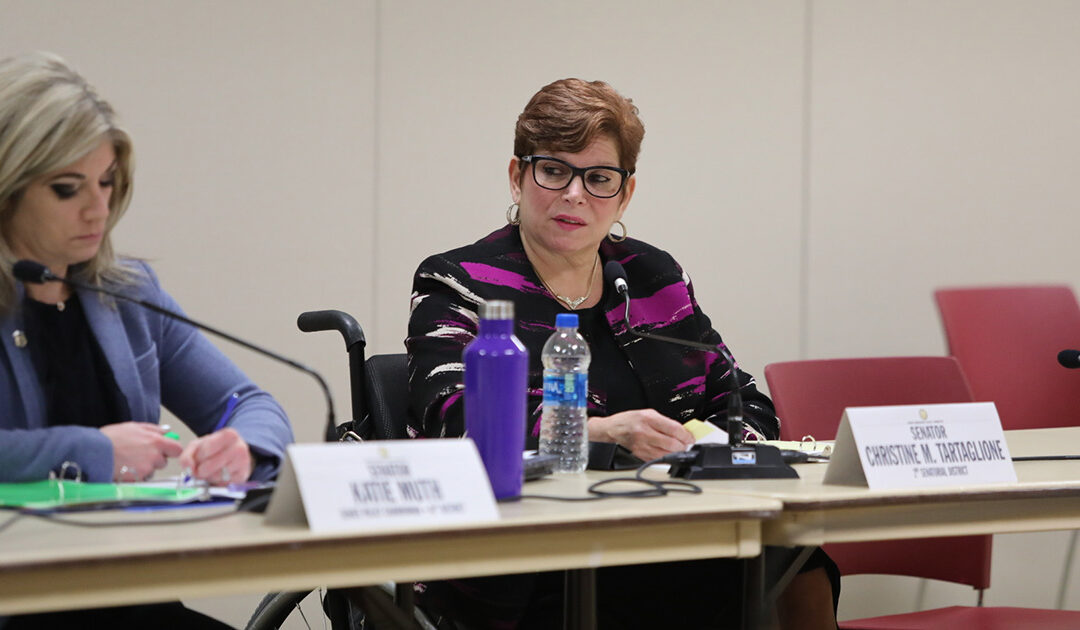
by Christin Brown | December 6, 2021 | News Releases
READING, December 6, 2021 – State Senator Katie Muth (D- Berks/Chester/Montgomery), Chair of the Pennsylvania Senate Democratic Policy Committee, today joined Senators Judy Schwank and Christine Tartaglione to host a public hearing on evaluating and improving drug treatment centers in Pennsylvania.
“The alarming rates of substance abuse and drug overdoses have been magnified throughout the COVID-19 pandemic. And when individuals and their families reach out for help and seek treatment, they do not have the resources and information available to make an informed choice about treatment facilities. Pennsylvania families deserve better,” Senator Muth said. “Today’s policy hearing allowed our Committee to hear from families who have tragically lost loved ones to addiction, and it also afforded us an opportunity to discuss possible legislative solutions and policy changes that can improve the evaluation process and treatment outcomes of Pennsylvania’s drug treatment centers. Patient outcome survey data should be guiding treatment plans, not insurance companies that often deny coverage for the care required for successful recovery.”
Pennsylvania has one of the highest rates of drug overdose in the nation and drug overdose deaths have increased in 46 of 67 counties in Pennsylvania throughout the COVID-19 pandemic. The Center for Disease Control’s National Center for Health Statistics indicated that there were over 100,000 drug overdose deaths in the United States during the 12-month period ending in April 2021, an increase of 28.5% from prior year.
“We must rethink our approach to adequately address the ongoing opioid epidemic, and one way to do that is to look at drug treatment centers. Individuals taking the crucial step of seeking treatment for addiction need to be given access to all the information they need to make the right decision for their own particular circumstances,” Schwank said. “This hearing provided us an opportunity to learn directly from individuals impacted by addiction, treatment providers and state regulators. It will give us a chance to better understand what factors make drug treatment more effective.”
Senator Schwank has introduced two bills – Senate Bill 975 and Senate Bill 976 – to address issues with Pennsylvania’s drug treatment facilities and recovery homes. Senate Bill 975 would require the Pennsylvania Department of Drug and Alcohol Programs (DDAP) to distribute an annual survey to all substance use disorder treatment centers and recovery homes operating in PA, record, and publish online for public access the responses provided by those treatment centers and recovery homes. Senate Bill 976 would prohibit any treatment center in PA to refuse admittance to anyone reporting to a treatment facility requesting medical or psychological services addressing substance use disorder – even if an individual is under the influence of drugs or alcohol at the time they report. It would also prohibit any health insurance company operating in PA from refusing coverage for admittance and provision of medical and psychological services.
“Today was a crucial step in addressing the crisis that is addiction, and the failure of treatment that surrounds it,” Tartaglione said. “The shifting demographics of addiction and overdoses show us that there is no community in this commonwealth that has not been touched by its devastation, from Erie to Philly and Allentown to Pittsburgh, the PA Senate Democrats are dedicated to bettering and expanding addiction treatment services offered.”
The Senate Democratic Policy Committee heard from several panelists at Reading Area Community College that included representatives from the Opioid Crisis Action Network, the Self-Help Movement, the Caron Foundation, the Council on Chemical Abuse, and the Pennsylvania Department of Drug and Alcohol Programs.
All submitted testimony from today’s hearing and the full video is available at SenatorMuth.com/Policy
# # #
Testimony
Panel 1: Affected People
Panel 2: Care Providers
Panel 3: Policy Solutions
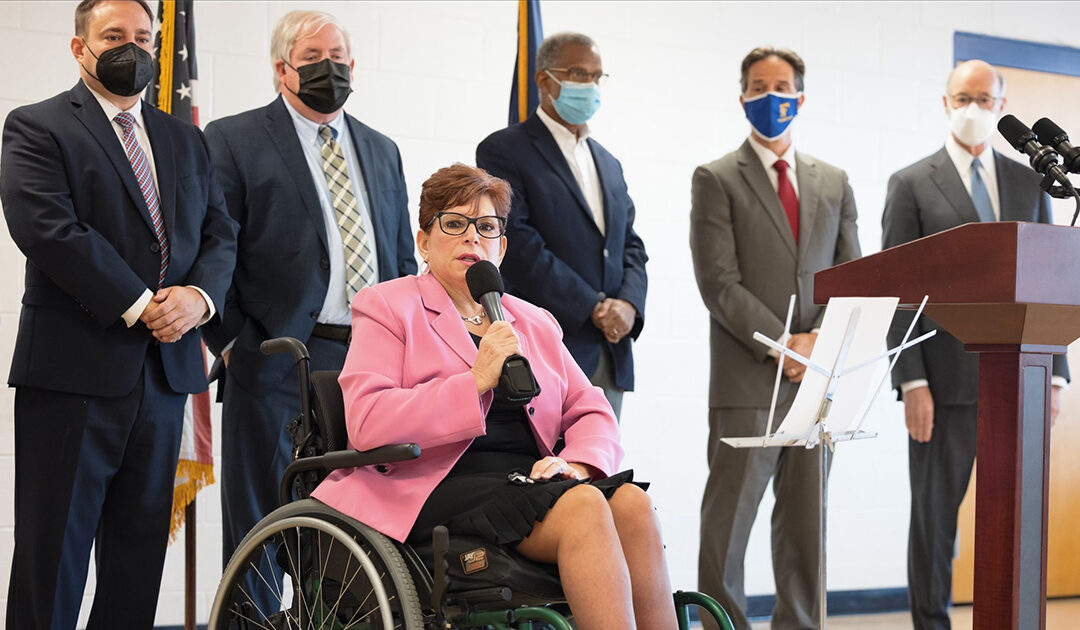
by Christin Brown | November 19, 2021 | feature, News Releases
Philadelphia, PA − November 19, 2021 − State Sen. Christine M. Tartaglione joined Gov. Tom Wolf as well as legislative colleagues and labor leaders today in Philadelphia to highlight the governor’s recent executive action and to call upon the legislature to finally pass legislation that supports and protects workers.
The governor’s order requires all businesses that receive grants or contracts from the commonwealth to provide its workers paid sick leave and pay no less than the $13.50/hour minimum wage for state employees. That wage, for state employees and contractors, will reach $15 on July 1, 2024.
“The governor’s recent action providing guaranteed paid leave, safer workplaces, and increased worker pay for employees of businesses that receive grants or contracts from the commonwealth is a great start.” Tartaglione said. “But we cannot let it end there. We currently have legislation pending in the senate that would codify these orders into law for all workers of this commonwealth.”
“Legislation like Senate Bills 12 and 310, which I have introduced, would raise the minimum wage for all workers in our commonwealth and extend Occupational Safety and Health Administration (OSHA) safety rules to all public employees. These are commonsense issues which would raise wages for nearly 700,000 workers as well as make all workplaces safer.”
Tartaglione and Wolf were joined at a news conference in Philadelphia by Department of Labor & Industry (L&I) Secretary Jennifer Berrier, members of the House and Senate Philadelphia Delegation, as well as members of Council 13 of the American Federation of State, County and Municipal Employees (AFSCME).
For more information on Gov. Wolf’s executive order visit his website. More information regarding Sen. Tartaglione’s legislation SB 12 and SB 310 is also available.
###

by Christin Brown | November 15, 2021 | feature, News Releases
PHILADELPHIA − November 15, 2021 – State Senator Katie Muth (D- Berks/Chester/Montgomery), Chair of the Pennsylvania Senate Democratic Policy Committee, today joined Senators Nikil Saval, John Kane, Christine Tartaglione and Lindsey Williams to host a public hearing to discuss issues related to worker misclassification in Pennsylvania.
“Worker misclassification isn’t just about building trades or construction, this issue impacts a whole segment of our workforce that deserves to be protected and paid fairly by their employers,” Senator Muth said. “I appreciate all of my colleagues and the panelists that participated today to shine a light on another instance of corporate greed – employers that are prioritizing profits over workers. It is time that we stand up for our workers in the state Senate.”
The Senate Democratic Policy Committee heard from several panelists at the Sheet Metal Workers Union Building in Philadelphia who all discussed the problems workers are face with when they are misclassified by their employers. The Keystone Research Center indicates that if Pennsylvania has rates of misclassification in the construction industry comparable to those in other states, it loses about $10 million in unemployment insurance taxes, at least $15 million in income tax revenues (and possibly three times as much), as much as $83 million in workers compensation premiums, and $200 million in federal income taxes.
“Worker misclassification is pervasive, and the resulting damages cut across all sectors of employment and all facets of our communities. Pennsylvania is a labor state with a long history of protecting workers’ rights, and it’s imperative that we continue this work in our swiftly changing economy,” Senator Saval said. “Just as companies that exploit workers can take these practices from state to state, Pennsylvania can create a model for worker protections that other states can adopt. How we approach this right now will impact the future of work.”
The hearing featured representation from various regional and statewide labor unions, including the Steamfitters Local 420, Painters DC21, Philadelphia Building and Construction Trades Council, PA AFL-CIO, and the Eastern Atlantic States Regional Council of Carpenters. Senator John Kane spent four decades as a union plumber prior to serving in the Senate and also served for twelve years as the Business Manager for one of the largest plumbers’ unions in the Commonwealth.
“My members earned good, family-sustaining wages and had good benefits. They had protections for workplace injuries and safe working conditions. When workers are misclassified as independent contractors, they lose these protections,” Senator Kane said. “I want to be clear – the misclassification of workers is a form of theft, plain and simple. Businesses cut costs to help their bottom line, and our workers pay the price. It’s long past time we took action to end worker misclassification, and I’m grateful to all our panelists for sharing their perspective in today’s hearing.”
The hearing also highlighted the worker misclassification issues experienced by workers in the app-based gig economy and discussed potential policy solutions to address the issue of worker misclassification. One bill discussed was Senate Bill 879 which was introduced by Senator Saval. This bill would hold general contractors responsible for paying any employees up and down a worksite, even if they are hired by a subcontractor.
“For too long unscrupulous employers have cut costs and corners by misclassifying Pennsylvania’s workers. The Pa Senate Democrats have and will continue to fight for the workers of this commonwealth,” Senator Tartaglione said. “Every worker deserves the protections that come with being an employee not a contractor. The cost of doing business cannot and should not be shifted onto a businesses’ employees.”
“Misclassification hurts workers, hurts employers who are doing the right thing by their workers, and it hurts taxpayers,” Senator Williams added.
All submitted testimony from today’s hearing and the full video is available at SenatorMuth.com/Policy
# # #
Testimony
Panel 1: Local Unions Roundtable
- Gary Masino, Sheetmetal Workers Local 19.
- Tom Redden, Steamfitters Local 420
- Tyler Honschke, Painters DC21
- Brian Eddis, Philadelphia Building Trades
Panel 2: Statewide Unions Roundtable
Panel 3: The Gig Economy
Panel 4: Policy Solutions

by Jessica Marpe | October 21, 2021 | News Releases
Philadelphia, Pa – October 21, 2021– Senator Christine M. Tartaglione, chairwoman of the PA Senate Labor and Industry Committee, today shared praise for Governor Wolf’s pro-worker agenda. The governor signed an executive order this morning calling for legislative action to create safer workplaces, promote higher wages and guarantee paid leave for workers. He encouraged the General Assembly to finally pass legislation that supports workers.
In response to the action and strong stance the governor is taking for workers, Senator Tartaglione issued the following statement:
“Today’s announcement from the Wolf Administration is a crucial first step in expanding worker protections and ensuring businesses that receive grants or contracts from the commonwealth provide family sustaining wages to all employees.
“Creating and maintaining family sustaining wages and expanding OSHA (Occupational Safety and Health Administration) protections have been the cornerstone of my legislative priorities. Governor Wolf’s actions today provide a great place to continue conversations regarding legislation, including SB12, a bill I introduced to raise the minimum wage for all workers across the commonwealth and SB310 which would expand OSHA protections to public sector employees.”





